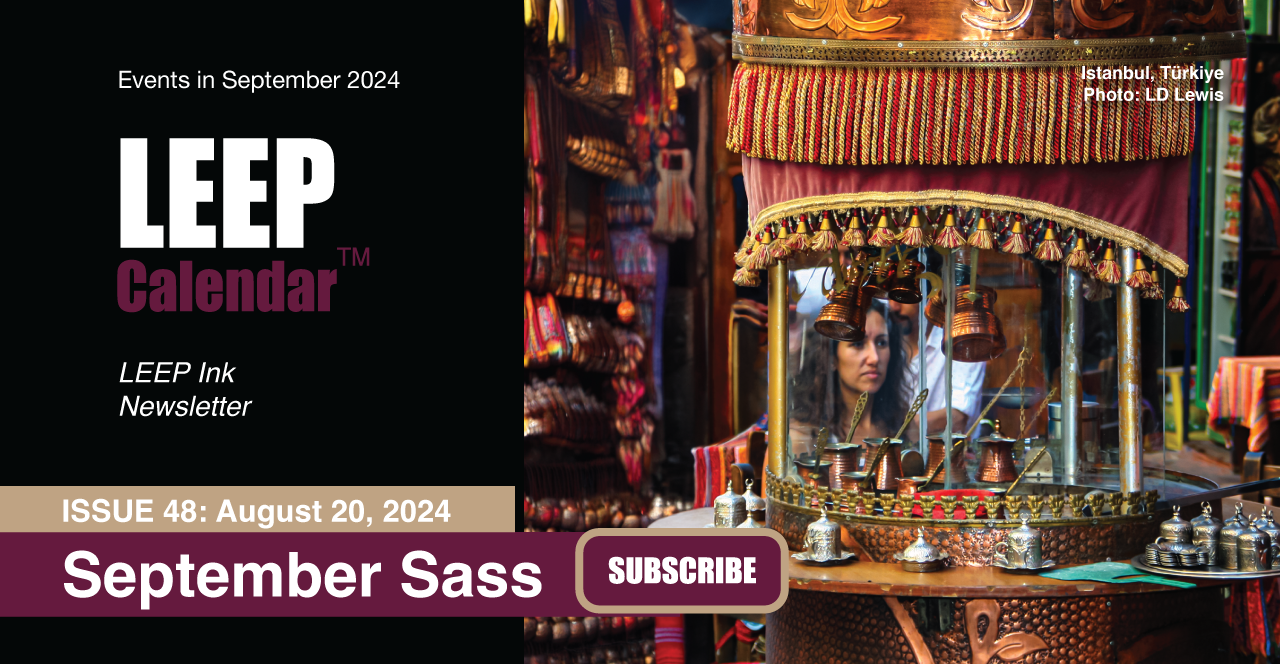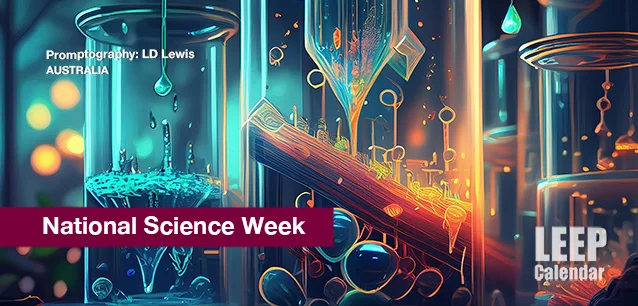 AD
AD
Today is: November 05
Scroll to explore events active on this date.
LEEP INK FEATURES

August is Appropos
A toddler playing in the fountain at a park in Santa Fe, New Mexico—Photo LD Lewis. In August, we live through the Dog Days of Summer. It's hot and often humid, and those ...

September is Sassy
Can you hear that sigh of relief from parents worldwide? Yes! September marks the return of students to school, a global phenomenon. Preparations for the ACT and SATs begin earnestly for ...

OOH LA LA, October
October is the busiest month for events, with 5% more happening than in May, the second most eventful month. Sailing enthusiasts will be glued to the finals of this year's Am...
About National Science Week in Australia
Environment Space & The Outdoors , Health
Technology & Telecom , Australia
Ends: Aug 17, 2025
DESCRIPTION:
NATIONAL SCIENCE WEEK IN AUSTRALIA: CELEBRATING INNOVATION AND DISCOVERY
National Science Week, held annually in August, is Australia's premier event celebrating science, technology, engineering, and mathematics (STEM). Launched in 1997, the Australian Government organizes this week-long festival through the Department of Industry, Science and Resources in collaboration with universities, schools, research institutions, libraries, museums, and science centers nationwide.
National Science Week aims to raise public awareness of the importance of science and technology, encourage young people to pursue STEM careers, and showcase Australia's scientific achievements. The event provides a platform for scientists, educators, and enthusiasts to engage with the community and promote a deeper understanding of scientific concepts and their applications. It also actively promotes diversity and inclusion in STEM, encouraging participation from all sections of society.
ACTIVITIES DURING SCIENCE WEEK
The week includes diverse activities designed to captivate and educate audiences of all ages, including
Interactive Workshops—Hands-on sessions where participants can engage in experiments and activities, fostering a practical understanding of scientific principles.
Public Lectures and Debates—Leading scientists and researchers present their work and discuss contemporary scientific issues, allowing the public to gain insights into cutting-edge research.
Science Exhibitions and Fairs—Displays and demonstrations showcasing the latest scientific innovations and discoveries, often accompanied by interactive elements for visitors.
School Activities and Competitions—Educational programs and contests designed to inspire students and encourage their interest in STEM fields.
Citizen Science Projects—Initiatives that involve the public in scientific research, enabling them to contribute to real-world scientific endeavors.
THE SCIENCES
National Science Week covers a broad spectrum of scientific disciplines, including but not limited to:
Biology—Exploring the living world, from genetics to ecosystems.
Physics—Investigating the fundamental principles governing matter and energy.
Chemistry—Examining the composition, properties, and reactions of substances.
Earth Sciences—Studying the planet's structure, processes, and history.
Astronomy—Delving into the mysteries of the universe and celestial phenomena.
Engineering—Highlighting innovations in design, technology, and problem-solving.
Mathematics—Demonstrating the crucial role of mathematical principles in various fields of science and technology.
Since its inception in 1997, National Science Week has grown into a significant national event, attracting over a million participants yearly. It plays a crucial role in fostering a culture of scientific curiosity and literacy, emphasizing the value of science in addressing global challenges and improving everyday life.
By engaging the public in dynamic and accessible ways, National Science Week helps bridge the gap between the scientific community and the broader population. It encourages a lifelong interest in science and empowers individuals to make informed decisions in an increasingly complex and technologically driven world.
VIDEOS
SUPPORTING DOCUMENTS
Currently, this event does not have supporting documents.
ADDITIONAL IMAGES
Currently, this event does not have supporting images.
Where would you like to go now?
 AD
AD


/footer-logo.svg)
